SDG 4, Academic Integrity and Artificial Intelligence: Clash or Win-Win Cooperation?
Abstract
1. Introduction
- To investigate the current state of research on the intersection of SDG 4, AI, and academic integrity;
- To identify the key trends and patterns in studies examining the impact of AI on educational quality, accessibility, and equity while considering ethical implications;
- To assess the potential benefits and challenges of AI implementation in educational settings, with a particular focus on academic integrity;
- To develop evidence-based recommendations for policymakers, educators, and researchers to ensure the ethical and effective use of AI in education, contributing to the achievement of SDG 4.
Hypotheses
2. Materials and Methods
- Method: bibliometric analysis of the content of scientific articles.
- Database: Scopus (https://www.scopus.com/, accessed on 1 September 2024).
- Bibliometric analysis tools: (1) VOSviewer v. 1.6.19 (https://www.vosviewer.com/, accessed on 1 September 2024, open access software); (2) SciVal (https://www.scival.com/, accessed on 1 September 2024, built-in Scopus database tool).
- -
- Stage 1. SDG 4;
- -
- Stage 2. Quality of education;
- -
- Stage 3. Integrity+: “academic integrity” OR “research integrity” OR “education* ethics” OR “scientific ethics” AND (LIMIT-TO (PUBYEAR, 2022) OR LIMIT-TO (PUBYEAR, 2023) OR LIMIT-TO (PUBYEAR, 2024)) AND (LIMIT-TO (DOCTYPE, “ar”)) AND (EXCLUDE (SUBJAREA, “MEDI”) OR EXCLUDE (SUBJAREA, “PSYC”) OR EXCLUDE (SUBJAREA, “NURS”) OR EXCLUDE (SUBJAREA, “BIOC”) OR EXCLUDE (SUBJAREA, “HEAL”) OR EXCLUDE (SUBJAREA, “VETE”) OR EXCLUDE (SUBJAREA, “DENT”) OR EXCLUDE (SUBJAREA, “IMMU”) OR EXCLUDE (SUBJAREA, “NEUR”) OR EXCLUDE (SUBJAREA, “PHAR”)).
- -
- Stage 1—keyword wheel;
- -
- Stage 2—keyword map with cluster analysis;
- -
- Stage 3—Keyword maps with cluster analysis, topic analysis, keyword occurrences, network analysis, key phrases, keyword wheel, keyword scatter (scholarly output/prominence percentile), topic clusters, views count by year, scholarly output, international collaboration, top 20 article keyword analysis.
3. Results
- Tool for analysis: SciVal.
- Number of articles for analysis: 17,458.
- Time frame: 2019–2024 (August 30).
- Subject area: all.
- Total number of keywords: 5726.
- Frame of keywords for analysis: top 1% by prominence.
- Tool for analysis: VOSviewer
- Number of articles for analysis: 7195.
- Time frame: 2022–2024 (August 30).
- Subject area: all.
- Total number of keywords: 22,005.
- Frame of keywords for analysis: minimum 14 occurrences (537 keywords, top 2%).
- Tool for analysis: VOSviewer and SciVal
- Number of articles for analysis: 3303.
- Time frame: 2022–2024 (August 30).
- Subject area: all, except medicine-related topics.
- Total number of keywords: 11,645.
- Frame of keywords for analysis: minimum 15 occurrences (154 keywords, top 1.5%).
4. Discussion
- The study emphasizes that higher education quality, innovation, information technology, artificial AI, and ethics are central topics in research related to SDG 4;
- AI has become a dominant area of research within education, particularly concerning its role in decision-making, learning models, natural language processing, and academic integrity;
- The rapid adoption of AI in education has outpaced the development of institutional policies, creating conflicts between students, teachers, and university management regarding academic integrity;
- The keyword maps for 2023 and 2024 highlight AI’s dominant role in discussions about education quality and ethics, contrasting with 2022, where AI was not yet prominent;
- By 2024, AI’s relationship with academic integrity has become a central research theme, with keywords linking AI, integrity, and policy development gaining prominence;
- Many research topics lie at the intersection of multiple disciplines, indicating that future research will require collaboration across fields such as AI, education, social sciences, and more;
- There is an increasing focus on detecting and preventing AI-generated content to maintain academic honesty, reflecting concerns over AI’s potential misuse.
5. Conclusions
- AI’s potential benefits: AI can personalize learning experiences, improve resource allocation, and facilitate data-driven decision-making in education. This aligns with the goals of SDG 4 to ensure inclusive, equitable, and quality education for all;
- Ethical challenges: the implementation of AI in education raises concerns regarding data privacy, algorithmic bias, and the digital divide. These challenges can hinder the equitable and effective use of AI, potentially exacerbating existing inequalities;
- Academic integrity: AI can be used to detect and prevent academic misconduct, such as plagiarism and cheating. However, there is also a risk that AI-powered tools could be misused to facilitate cheating or undermine the principles of academic integrity.
- What about the recommendations for key stakeholders?
- Identification of key ethical concerns: the bibliometric analysis identifies and discusses key ethical concerns associated with AI in education. These concerns are critical to address to ensure the responsible and equitable use of AI in educational settings.
- Recommendations for ethical AI implementation: based on the findings, the bibliometric analysis provides recommendations for the ethical and responsible implementation of AI in education. These recommendations may include guidelines for data privacy, measures to address algorithmic bias, and strategies for ensuring equitable access to AI-powered educational resources.
- Contribution to the broader literature: The review adds to the growing body of research on AI in education and academic integrity, providing valuable insights and evidence for policymakers, educators, and researchers.
Author Contributions
Funding
Institutional Review Board Statement
Informed Consent Statement
Data Availability Statement
Acknowledgments
Conflicts of Interest
References
- Okulich-Kazarin, V.; Artyukhov, A.; Skowron, Ł.; Artyukhova, N.; Dluhopolskyi, O.; Cwynar, W. Sustainability of Higher Education: Study of Student Opinions about the Possibility of Replacing Teachers with AI Technologies. Sustainability 2024, 16, 55. [Google Scholar] [CrossRef]
- Boeren, E. Understanding Sustainable Development Goal (SDG) 4 on “quality education” from micro, meso and macro perspectives. Int. Rev. Educ. 2019, 65, 277–294. [Google Scholar] [CrossRef]
- Saini, M.; Sengupta, E.; Singh, M.; Singh, H.; Singh, J. Sustainable Development Goal for Quality Education (SDG 4): A study on SDG 4 to extract the pattern of association among the indicators of SDG 4 employing a genetic algorithm. Educ. Inf. Technol. 2022, 28, 2031–2069. [Google Scholar] [CrossRef]
- UNESCO. Global Education Monitoring Report 2019: Migration, Displacement and Education—Building Bridges, Not Walls; UNESCO: Paris, France, 2019; 362p, Available online: https://www.unesco.org/gem-report/en/migration (accessed on 1 September 2024).
- Topcu, E. Education and Economic Growth: Evidence from the EUROMED Countries. Eur. Rev. 2023, 31, 632–646. [Google Scholar] [CrossRef]
- UNESCO. Education in a Post-COVID World: Nine Ideas for Public Action; UNESCO: Paris, France, 2021; Available online: https://www.unesco.org/en/articles/education-post-covid-world-nine-ideas-public-action (accessed on 1 September 2024).
- Balta, N. Ethical Considerations in Using AI in Educational Research. J. Res. Didact. Sci. 2023, 2, 14205. [Google Scholar] [CrossRef]
- Almasri, F. Exploring the Impact of Artificial Intelligence in Teaching and Learning of Science: A Systematic Review of Empirical Research. Res. Sci. Educ. 2024, 54, 977–997. [Google Scholar] [CrossRef]
- Vinuesa, R.; Azizpour, H.; Leite, I.; Balaam, M.; Dignum, V.; Domisch, S.; Felländer, A.; Langhans, S.D.; Tegmark, M.; Nerini, F.F. The role of artificial intelligence in achieving the Sustainable Development Goals. Nat. Commun. 2020, 11, 233. [Google Scholar] [CrossRef]
- Ogunleye, J.K.; Afolabi, C.S.; Ajayi, S.O.; Omotayo, V.A. Virtual Learning as an Impetus for Business Education Programme in the Midst of COVID-19 in Nigeria. Health Econ. Manag. Rev. 2023, 4, 83–89. [Google Scholar] [CrossRef]
- Oe, H.; Zhu, X.; Weeks, K. Exploring Leadership and Other Influential Dimensions When Assessing Online Learning Modules within Higher Education Institutions: Insights from Flow Theory and Two-Factor Principles. Bus. Ethics Leadersh. 2024, 8, 20–34. [Google Scholar] [CrossRef]
- Kaouache, D.E.; Amara, C.; Chatter, C.; Kaouache, A. The Effect of Individual Entrepreneurial Orientation on Entrepreneurial Intention Among University Students. Bus. Ethics Leadersh. 2024, 8, 63–75. [Google Scholar] [CrossRef]
- Yang, Y.; Yin, T.; Li, R.; Wang, X. Effectiveness of Higher Education Financing: DEA and SFA Modelling. Bus. Ethics Leadersh. 2024, 8, 172–189. [Google Scholar] [CrossRef]
- Roba, M.; Moulay, O.K. Risk Management in Using Artificial Neural Networks. SocioEcon. Chall. 2024, 8, 302–313. [Google Scholar] [CrossRef]
- Tchoketch-Kebir, H.; Madouri, A. Research Leadership and High Standards in Economic Forecasting: Neural Network Models Compared with Etalon ARIMA Models. Bus. Ethics Leadersh. 2024, 8, 220–233. [Google Scholar] [CrossRef]
- Mujtaba, B. Clarifying Ethical Dilemmas in Sharpening Students’ Artificial Intelligence Proficiency: Dispelling Myths About Using AI Tools in Higher Education. Bus. Ethics Leadersh. 2024, 8, 107–127. [Google Scholar] [CrossRef]
- Nuñez, J.G.; Bolognesi, M. Exploring Team Collaboration in the New Metaverse (The 3D-AI Internet). SocioEcon. Chall. 2024, 8, 314–341. [Google Scholar] [CrossRef]
- Hrytsenko, L.; Pakhnenko, O.; Kuzior, A.; Kozhushko, I. Smart technologies in banking. Financ. Mark. Inst. Risks 2024, 8, 81–93. [Google Scholar] [CrossRef]
- Priyadarshi, A.; Singh, P. Role of FinTech Apps in Increasing Investment Decisions: A Study on the Capital Market. Financ. Mark. Inst. Risks 2024, 8, 186–197. [Google Scholar] [CrossRef]
- Leonov, S.; Yarovenko, H.; Boiko, A.; Dotsenko, T. Information system for monitoring banking transactions related to money laundering. CEUR Workshop Proc. 2019, 2422, 297–307. Available online: https://ceurspt.wikidata.dbis.rwth-aachen.de/Vol-2422/paper24.pdf (accessed on 1 September 2024). [CrossRef]
- Lyeonov, S.; Żurakowska-Sawa, J.; Kuzmenko, O.; Koibichuk, V. Gravitational and intellectual data analysis to assess the money laundering risk of financial institutions. J. Int. Stud. 2020, 13, 259–272. [Google Scholar] [CrossRef]
- Sheliemina, N. The Use of Artificial Intelligence in Medical Diagnostics: Opportunities, Prospects and Risks. Health Econ. Manag. Rev. 2024, 5, 104–124. [Google Scholar] [CrossRef]
- Pakhnenko, O.; Pudło, T. HealthTech in ensuring the resilience of communities in the post-pandemic period. Health Econ. Manag. Rev. 2023, 4, 31–39. [Google Scholar] [CrossRef]
- Wright, J. Healthcare cybersecurity and cybercrime supply chain risk management. Health Econ. Manag. Rev. 2023, 4, 17–27. [Google Scholar] [CrossRef]
- Strielkowski, W.; Samoilikova, A.; Smutka, L.; Civín, L.; Lieonov, S. Dominant trends in intersectoral research on funding innovation in business companies: A bibliometric analysis approach. J. Innov. Knowl. 2022, 7, 100271. [Google Scholar] [CrossRef]
- Bilan, S.; Šuleř, P.; Skrynnyk, O.; Krajňáková, E.; Vasilyeva, T. Systematic bibliometric review of artificial intelligence technology in organizational management, development, change and culture. Bus. Theory Pract. 2022, 23, 1–13. [Google Scholar] [CrossRef]
- Niftiyev, I.; Kheyirkhabarli, M. The Impact of COVID-19 Pandemic on Cryptocurrency Adoption in Investments: A Bibliometric Study. SocioEcon. Chall. 2024, 8, 154–169. [Google Scholar] [CrossRef]
- Borissov, D. Agile Methods in the Social Work: Research Landscape Analysis. SocioEcon. Chall. 2024, 8, 64–87. [Google Scholar] [CrossRef]
- Zámek, D.; Zakharkina, Z. Research Trends in the Impact of Digitization and Transparency on National Security: Bibliometric Analysis. Financ. Mark. Inst. Risks 2024, 8, 173–188. [Google Scholar] [CrossRef]
- Kozhushko, I. Transformation of Financial Services Industry in Conditions of Digitalization of Economy. Financ. Mark. Inst. Risks 2023, 7, 189–200. [Google Scholar] [CrossRef]
- Dobrovolska, O.; Ortmanns, W.; Podosynnikov, S.; Halynskyi, D.; Miniailo, A. Start-Ups and Entrepreneurship in Renewable Energy: Investments and Risks. Financ. Mark. Inst. Risks 2024, 8, 213–240. [Google Scholar] [CrossRef]
- Huzenko, M.; Kononenko, S. Sustainable Agriculture: Impact on Public Health and Sustainable Development. Health Econ. Manag. Rev. 2024, 5, 125–150. [Google Scholar] [CrossRef]
- Artyukhov, A.; Volk, I.; Surowiec, A.; Skrzypek-Ahmed, S.; Bliumska-Danko, K.; Dluhopolskyi, O.; Shablystyi, V. Quality of Education and Science in the Context of Sustainable Development Goals—From Millennium Goals to Agenda 2030: Factors of Innovation Activity and Socioeconomic Impact. Sustainability 2022, 14, 11468. [Google Scholar] [CrossRef]
- Artyukhov, A.; Volk, I.; Vasylieva, T.; Lyeonov, S. The role of the university in achieving SDGs 4 and 7: A Ukrainian case. E3S Web Conf. 2021, 250, 04006. [Google Scholar] [CrossRef]
- Volk, I.; Artyukhov, A.; Lyeonov, S. Modeling of information system for blended education quality assurance and socioeconomic impact. In Proceedings of the 2022 IEEE 16th International Conference on Advanced Trends in Radioelectronics, Telecommunications and Computer Engineering (TCSET), Lviv-Slavske, Ukraine, 22–26 February 2022; pp. 590–593. [Google Scholar] [CrossRef]
- Okulich-Kazarin, V.; Artyukhov, A.; Skowron, Ł.; Artyukhova, N.; Wołowiec, T. Will AI Become a Threat to Higher Education Sustainability? A Study of Students’ Views. Sustainability 2024, 16, 4596. [Google Scholar] [CrossRef]
- Rudolph, J.; Tan, S.; Tan, S. ChatGPT: Bullshit spewer or the end of traditional assessments in higher education? J. Appl. Learn. Teach. 2023, 6, 342–363. [Google Scholar] [CrossRef]
- Cotton, D.R.E.; Cotton, P.A.; Shipway, J.R. Chatting and cheating: Ensuring academic integrity in the era of ChatGPT. Innov. Educ. Teach. Int. 2024, 61, 228–239. [Google Scholar] [CrossRef]
- Lim, W.M.; Gunasekara, A.; Pallant, J.L.; Pallant, J.I.; Pechenkina, E. Generative AI and the future of education: Ragnarök or reformation? A paradoxical perspective from management educators. Int. J. Manag. Educ. 2023, 21, 100790. [Google Scholar] [CrossRef]
- Farrokhnia, M.; Banihashem, S.K.; Noroozi, O.; Wals, A. A SWOT analysis of ChatGPT: Implications for educational practice and research. Innov. Educ. Teach. Int. 2024, 61, 460–474. [Google Scholar] [CrossRef]
- Rudolph, J.; Tan, S.; Tan, S. War of the chatbots: Bard, Bing Chat, ChatGPT, Ernie and beyond. The new AI gold rush and its impact on higher education. J. Appl. Learn. Teach. 2023, 6, 364–389. [Google Scholar] [CrossRef]
- Wu, T.; He, S.; Liu, J.; Sun, S.; Liu, K.; Han, Q.-L.; Tang, Y. A Brief Overview of ChatGPT: The History, Status Quo and Potential Future Development. IEEE/CAA J. Autom. Sin. 2023, 10, 1122–1136. [Google Scholar] [CrossRef]
- Rahman, M.M.; Watanobe, Y. ChatGPT for Education and Research: Opportunities, Threats, and Strategies. Appl. Sci. 2023, 13, 5783. [Google Scholar] [CrossRef]
- Perkins, M. Academic Integrity considerations of AI Large Language Models in the post-pandemic era: ChatGPT and beyond. J. Univ. Teach. Learn. Pract. 2023, 20, 7. [Google Scholar] [CrossRef]
- Crawford, J.; Cowling, M.; Allen, K.-A. Leadership is needed for ethical ChatGPT: Character, assessment, and learning using artificial intelligence (AI). J. Univ. Teach. Learn. Pract. 2023, 20, 02. [Google Scholar] [CrossRef]
- Sullivan, M.; Kelly, A.; McLaughlan, P. ChatGPT in higher education: Considerations for academic integrity and student learning. J. Appl. Learn. Teach. 2023, 6, 31–40. [Google Scholar] [CrossRef]
- Chan, C.K.Y. A comprehensive AI policy education framework for university teaching and learning. Int. J. Educ. Technol. High. Educ. 2023, 20, 38. [Google Scholar] [CrossRef]
- Strzelecki, A. To use or not to use ChatGPT in higher education? A study of students’ acceptance and use of technology. Interact. Learn. Environ. 2023, 1–14. [Google Scholar] [CrossRef]
- Yan, D. Impact of ChatGPT on learners in a L2 writing practicum: An exploratory investigation. Educ. Inf. Technol. 2023, 28, 13943–13967. [Google Scholar] [CrossRef]
- Eke, D.O. ChatGPT and the rise of generative AI: Threat to academic integrity? J. Responsible Technol. 2023, 13, 100060. [Google Scholar] [CrossRef]
- Shoufan, A. Exploring Students’ Perceptions of ChatGPT: Thematic Analysis and Follow-Up Survey. IEEE Access 2023, 11, 38805–38818. [Google Scholar] [CrossRef]
- Javaid, M.; Haleem, A.; Singh, R.P.; Khan, S.; Khan, I.H. Unlocking the opportunities through ChatGPT Tool towards ameliorating the education system. BenchCouncil Trans. Benchmarks Stand. Eval. 2023, 3, 100115. [Google Scholar] [CrossRef]
- Holmes, W.; Tuomi, I. State of the art and practice in AI in education. Eur. J. Educ. 2022, 57, 542–570. [Google Scholar] [CrossRef]
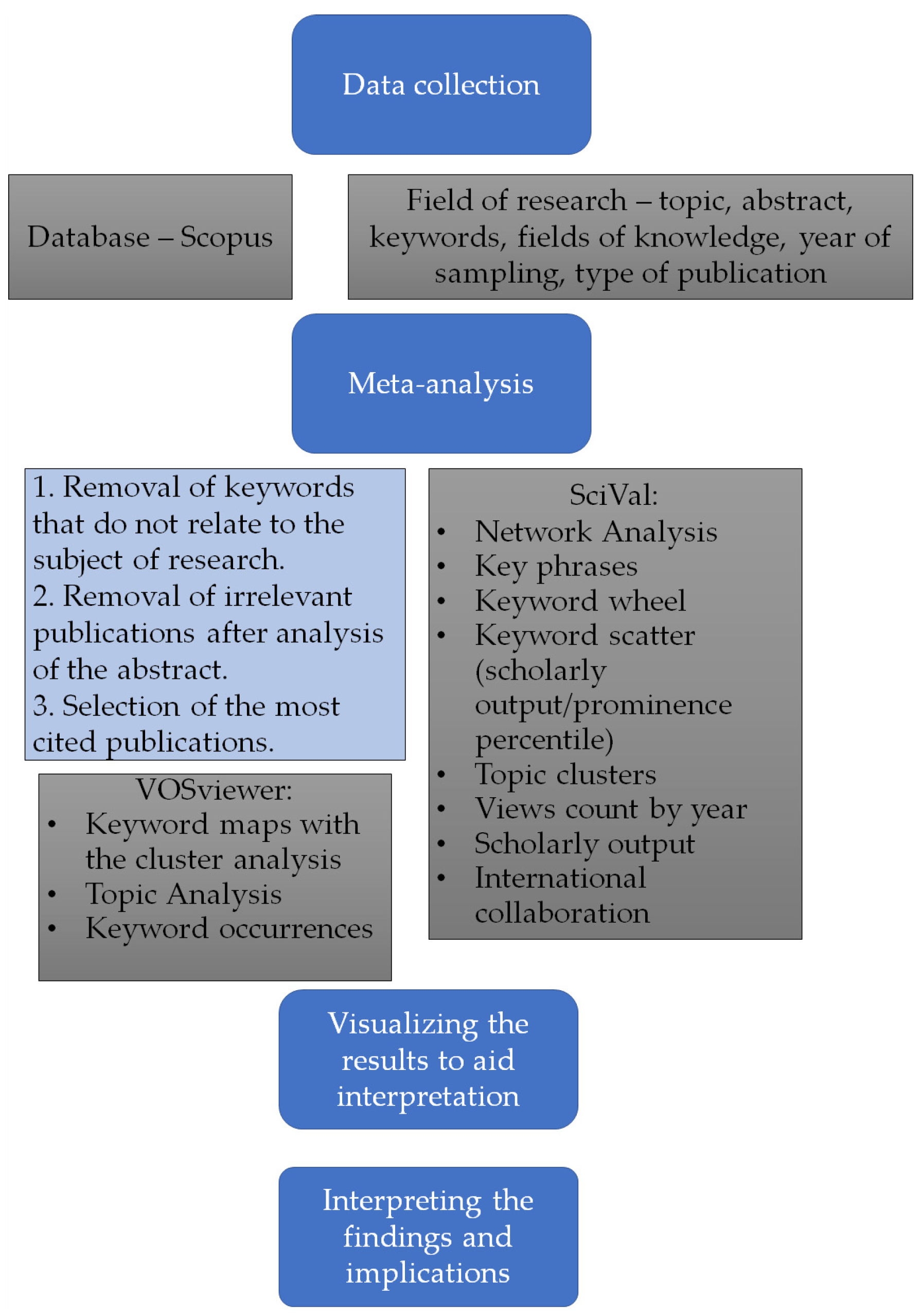
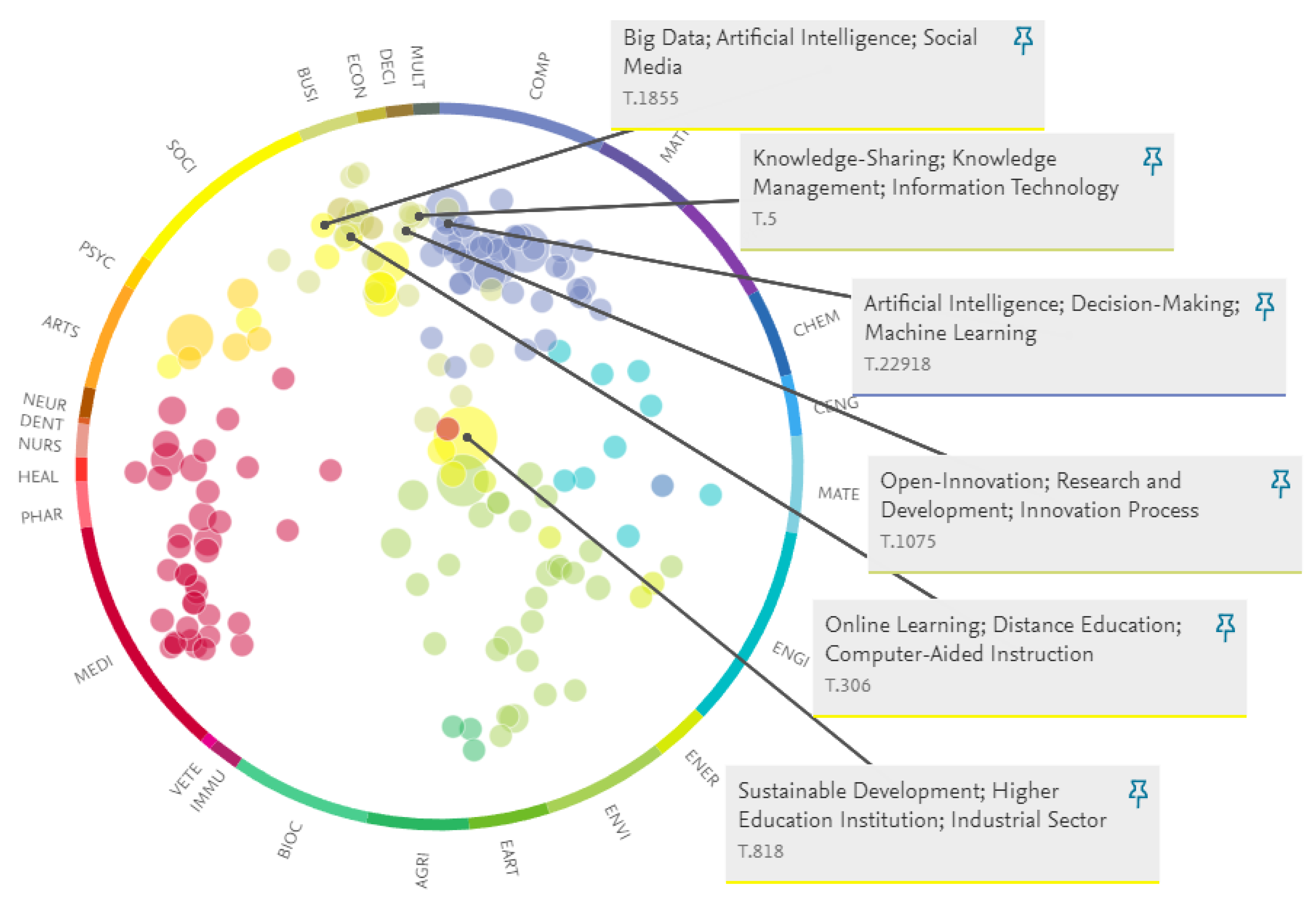
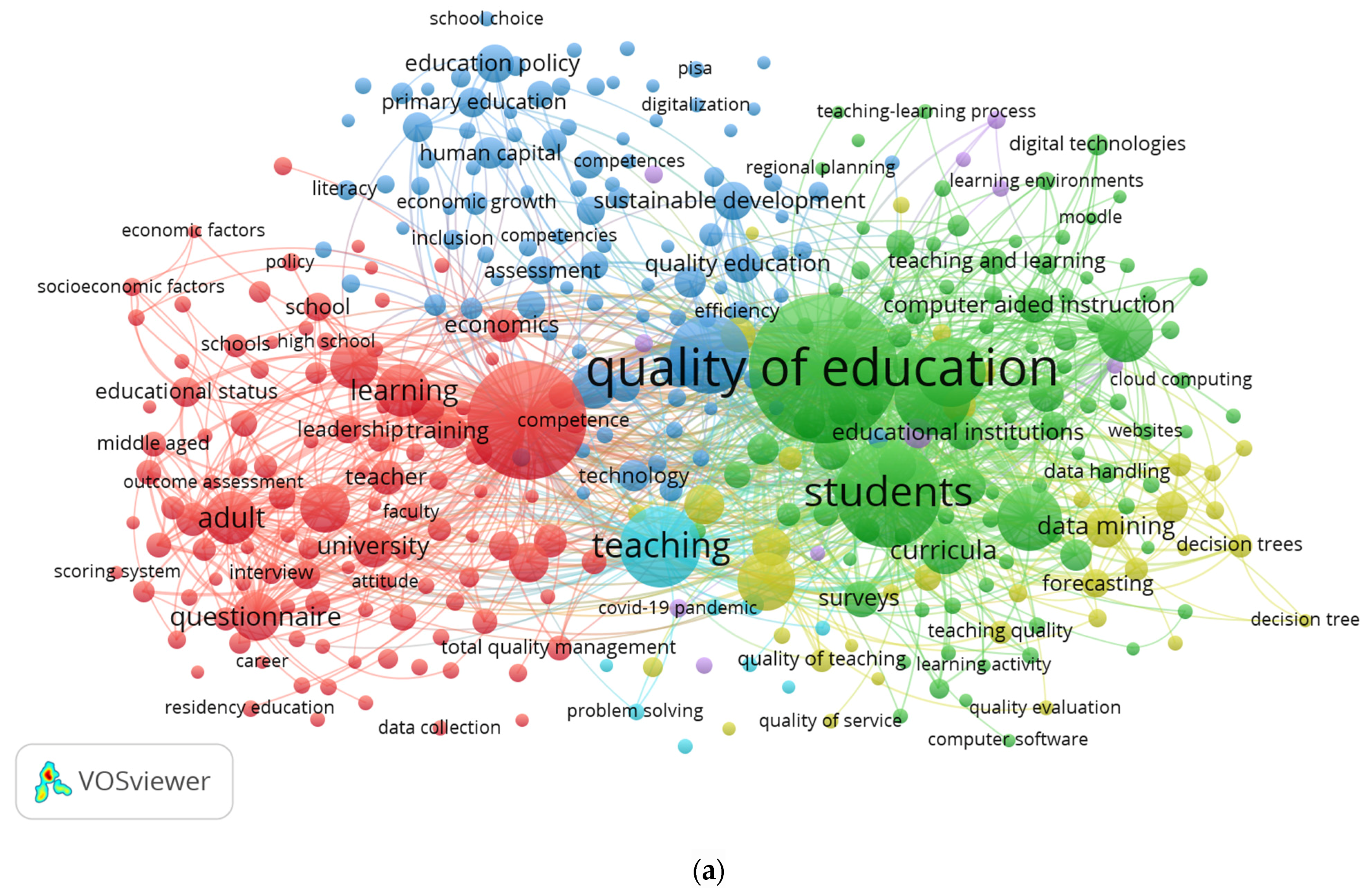
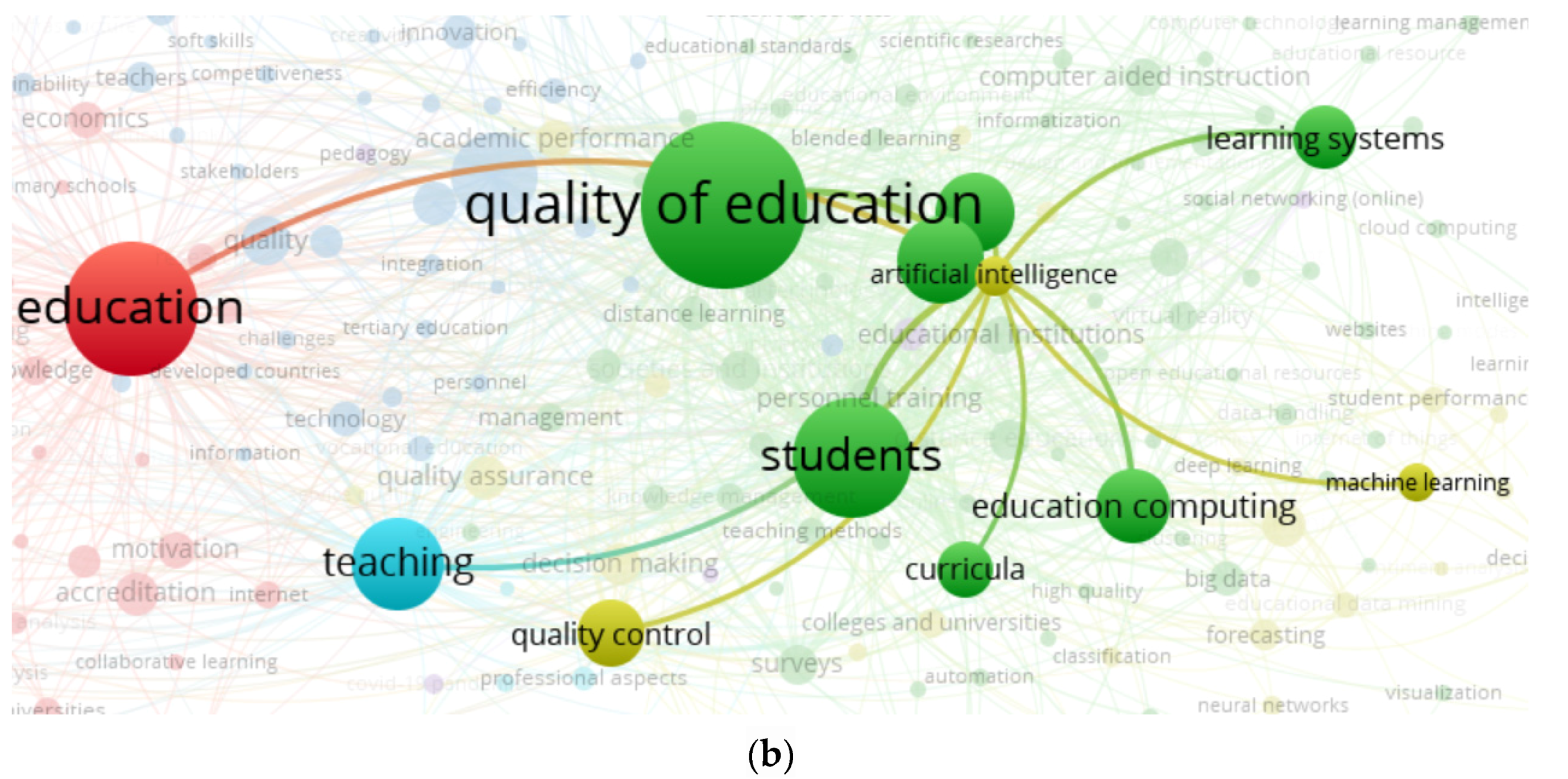
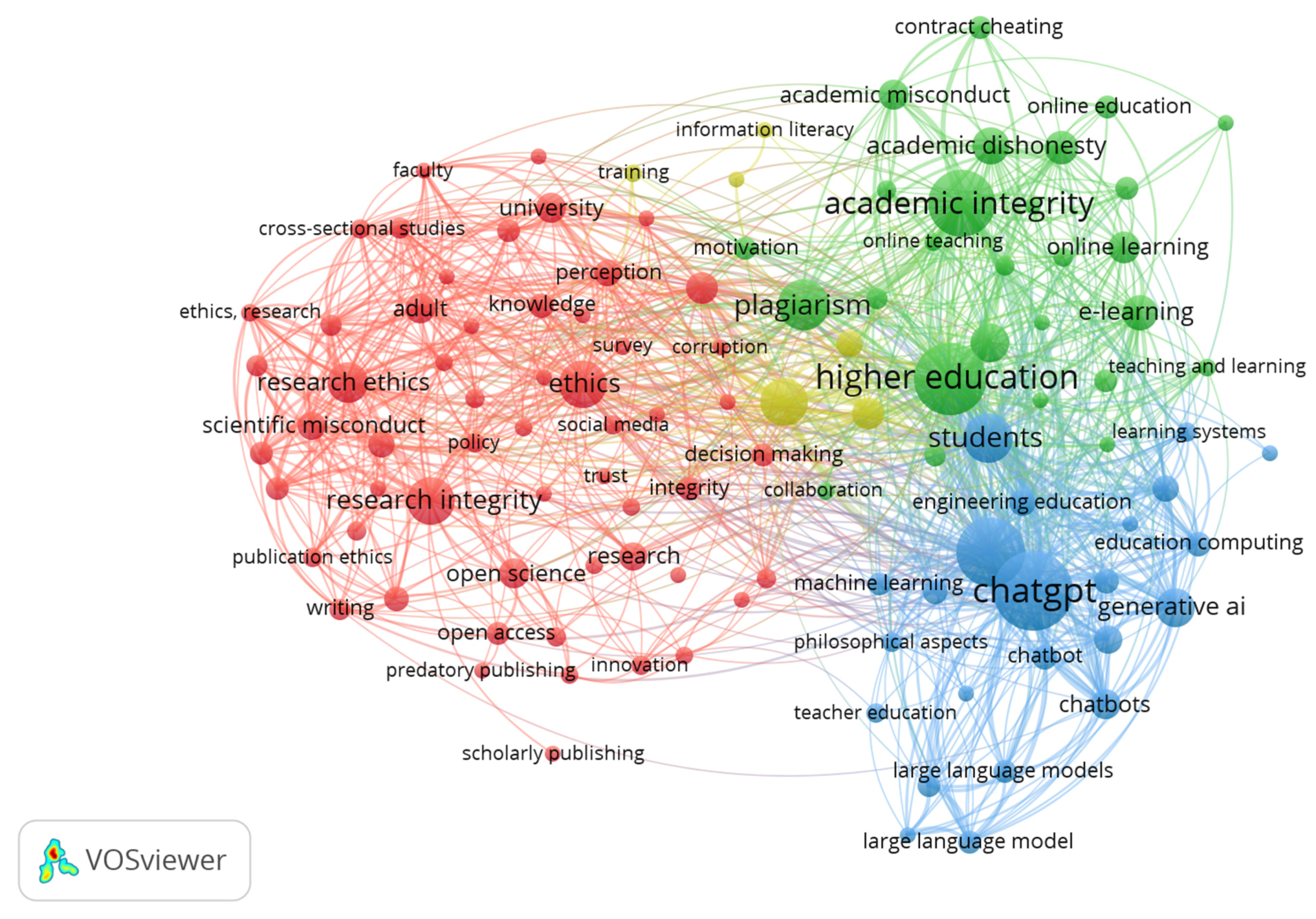
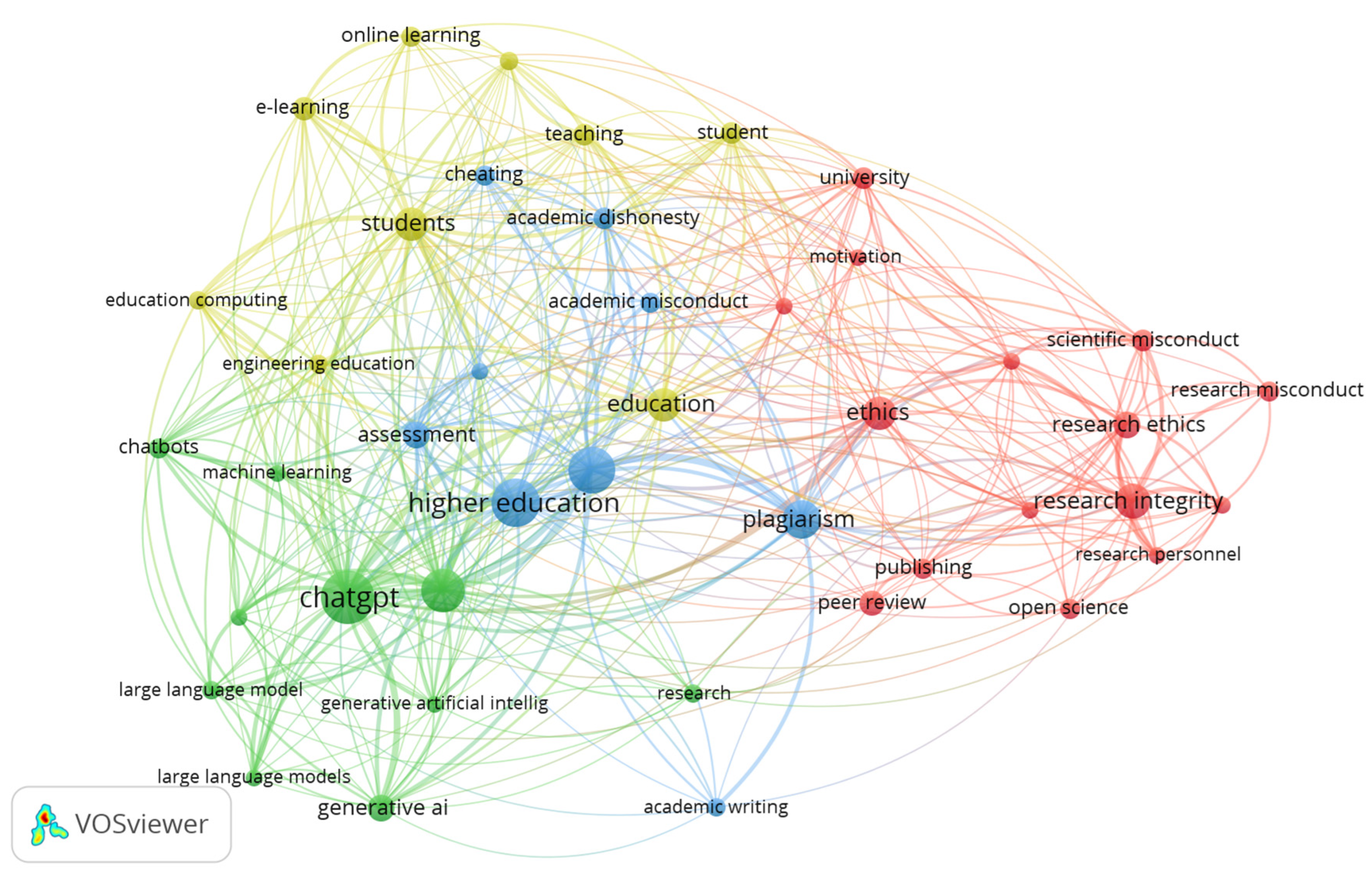
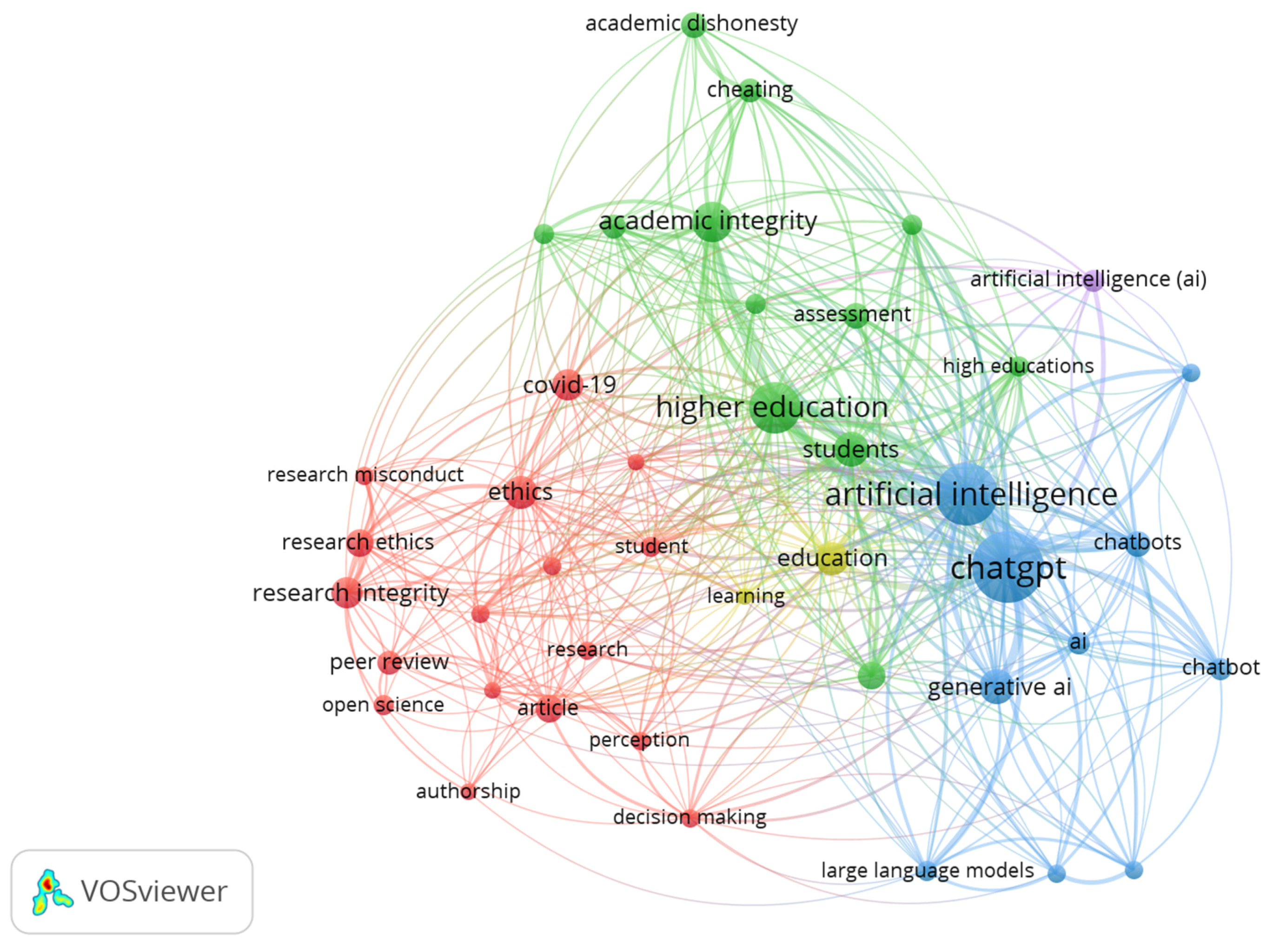
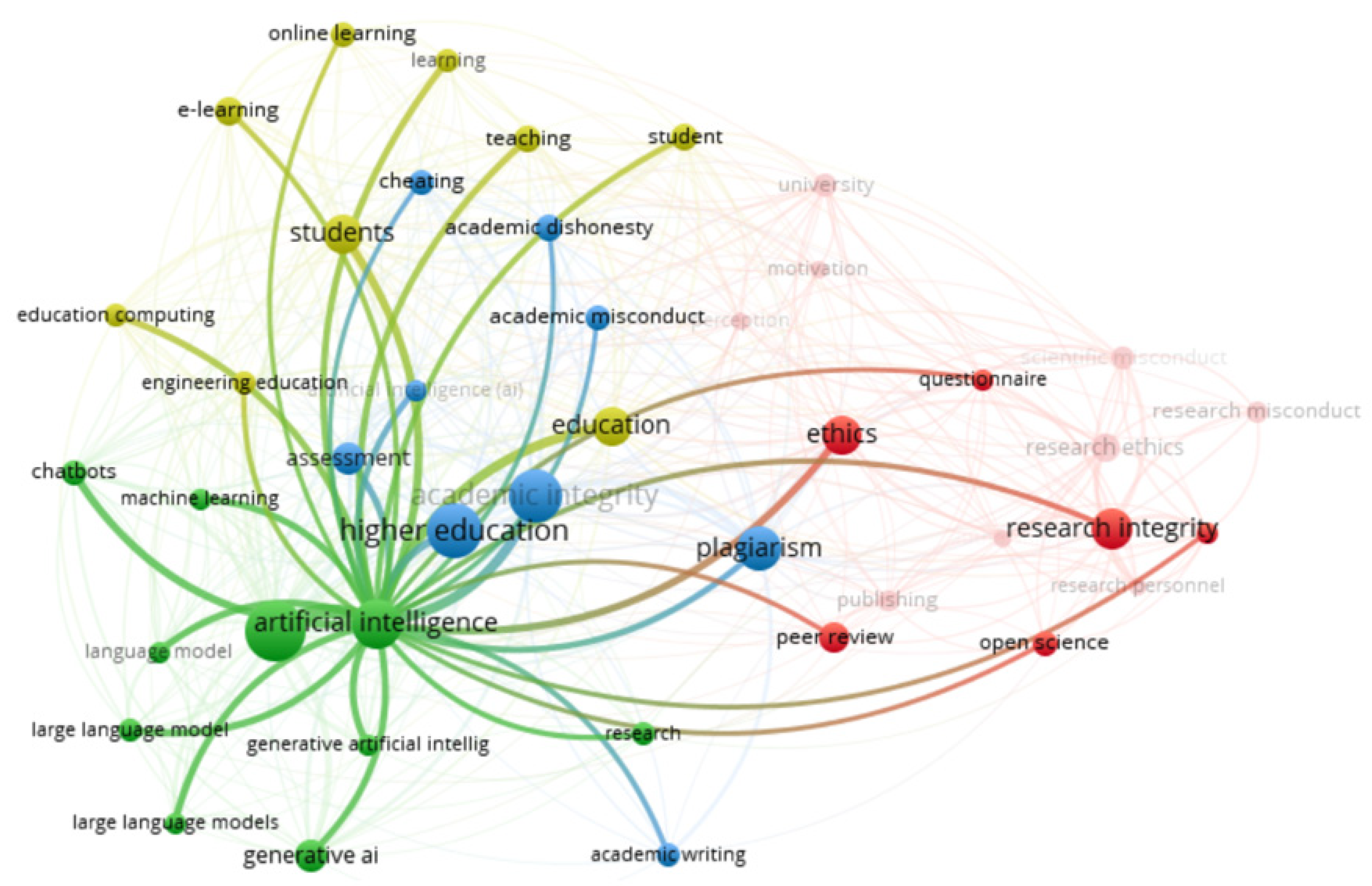

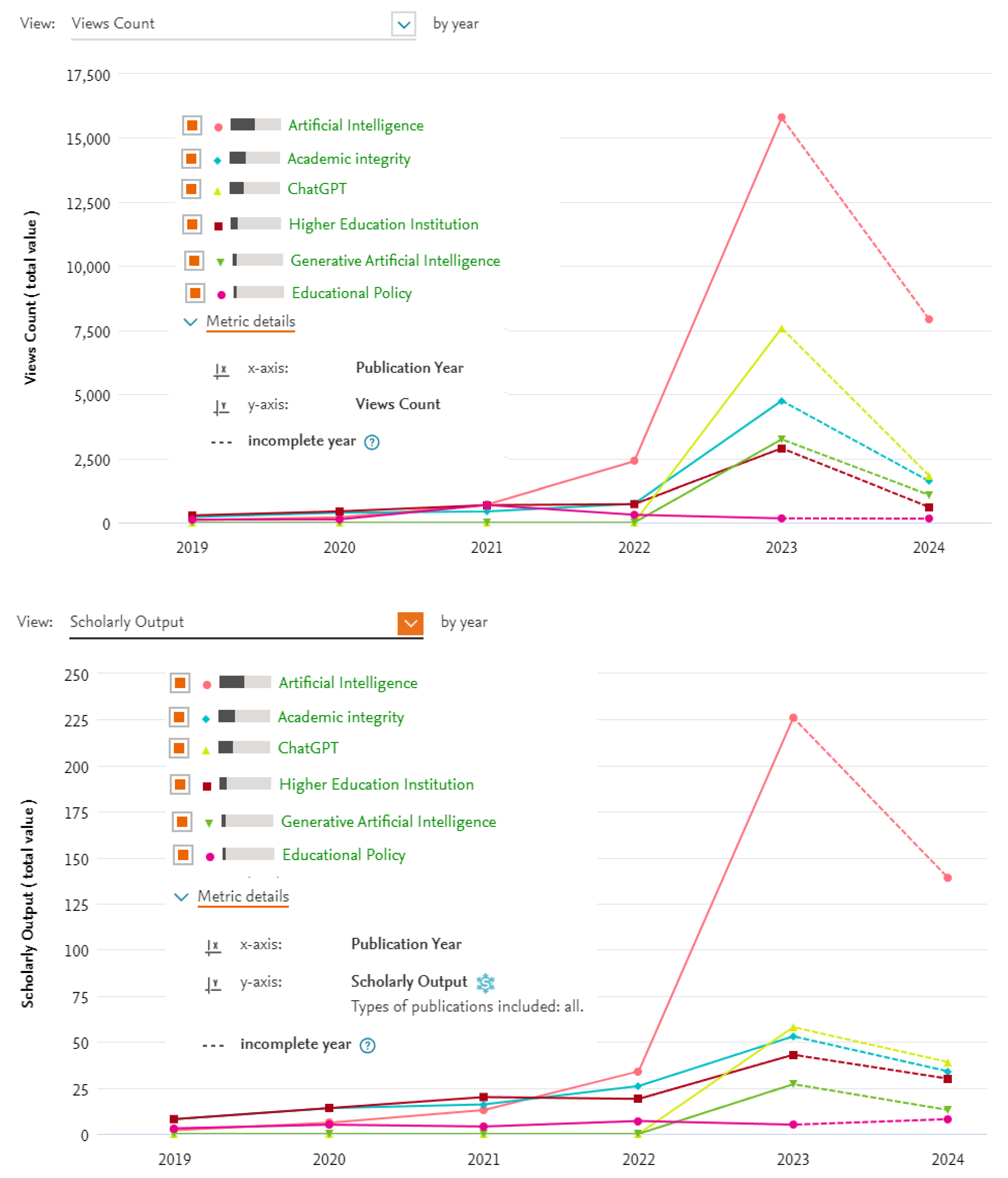
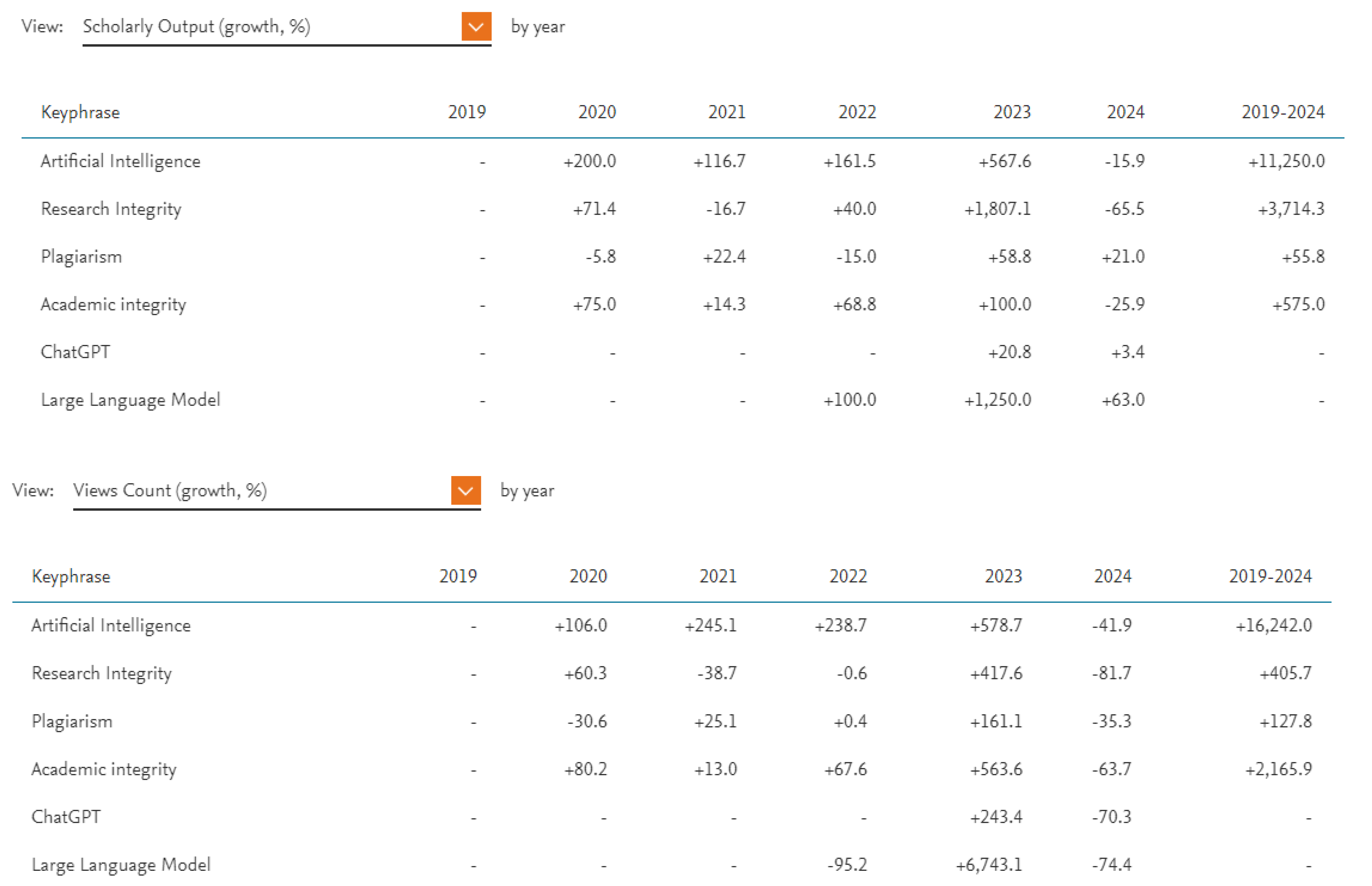
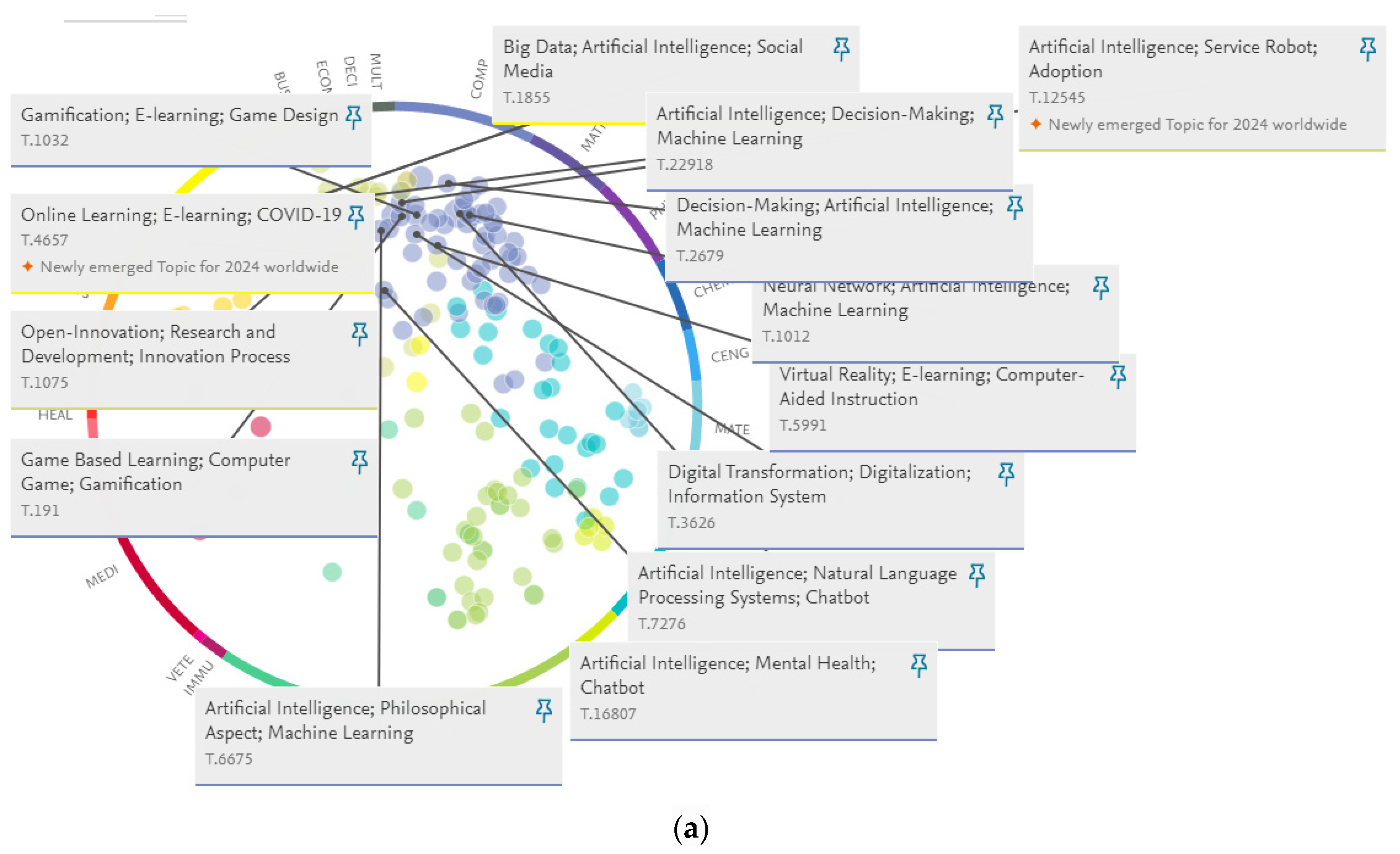
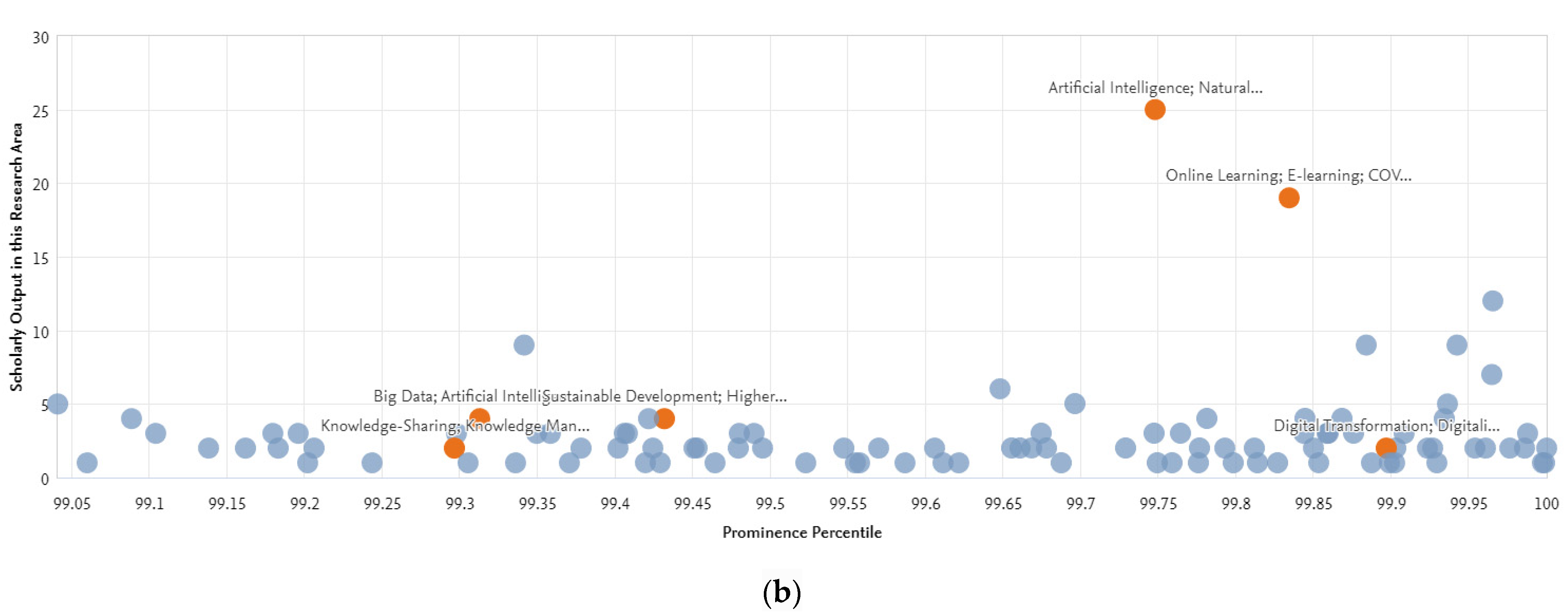
| Keyword (Key Phrase) | Number of Occurrences |
|---|---|
| Higher education | 497 |
| Sustainable development + SDGs + sustainability | 188 |
| Quality assurance | 130 |
| University | 122 |
| Decision making | 116 |
| Artificial intelligence + intelligent systems | 108 |
| Information technology | 80 |
| Culture | 26 |
| Ethics | 15 |
| Education policy | 14 |
| Keyword (Key Phrase) | Number of Occurrences (2022) | Number of Occurrences (2023) | Number of Occurrences (2024) |
|---|---|---|---|
| ChatGPT | - | 142 | 232 |
| Artificial intelligence | - | 111 | 219 |
| Generative artificial intelligence | - | 50 | 94 |
| Large language model | - | 48 | 51 |
| Topic Cluster | Prominence Percentile, Progress |
|---|---|
| Artificial Intelligence; Natural Language Processing Systems; Chatbot | 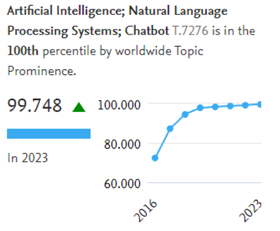 |
| Sustainable Development; Higher Education Institution; Industrial Sector | 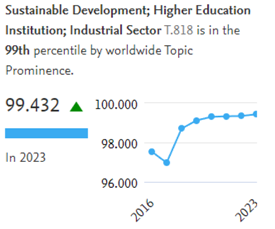 |
| Big Data; Artificial Intelligence; Social Media | 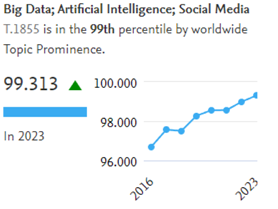 |
| Knowledge-Sharing; Knowledge Management; Information Technology | 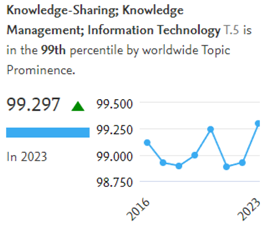 |
| Digital Transformation; Digitalization; Information System |  |
| Artificial Intelligence; Mental Health; Chatbot |  |
| Year | Source | Author Keywords |
|---|---|---|
| 2023 | Rudolph et al. [37] | Artificial Intelligence (AI); Artificial Intelligence in Education (AIEd); assessment; ChatGPT; Generative Pre-trained Transformer 3 (GPT-3); higher education; learning & teaching; natural language processing (NLP) |
| 2024 | Cotton et al. [38] | detection and prevention; higher education; Machine-generated writing; plagiarism |
| 2023 | Lim et al. [39] | Academic integrity; Bard; ChatGPT; Critical analysis; DALL-E; Education; Educator; Ethics; Future of education; Generative AI; Generative artificial intelligence; Google; Management education; Management educator; OpenAI; Paradox; Paradox theory; Ragnarök; Reformation; Transformation; Transformative education |
| 2024 | Farrokhnia et al. [40] | Artificial intelligence; ChatGPT; educational technologies; higher education; SWOT analysis |
| 2023 | Rudolph et al. [41] | Artificial intelligence (AI); assessment; Bard; Bing Chat; chatbots in higher education; ChatGPT; conversational agents; Ernie; generative pre-trained transformers (GPT); higher education; large language models (LLMs); learning & teaching |
| 2023 | Wu et al. [42] | AIGC; ChatGPT; GPT-3; GPT-4; human feedback; large language models |
| 2023 | Rahman [43] | AI for code; artificial intelligence; ChatGPT; ChatGPT survey; educational technology; GPT-3; GPT-4; large language model; programming education; research |
| 2023 | Perkins [44] | Artificial Intelligence; ChatGPT; GPT-3; Large Language Models; plagiarism |
| 2023 | Crawford et al. [45] | Academic Integrity; Artificial Intelligence; Chatgpt; Large Language Model; openai; student character |
| 2023 | Sullivan et al. [46] | Academic integrity; artificial intelligence; ChatGPT; equity; higher education; student learning |
| 2023 | Chan [47] | AI policy framework; Artificial intelligence; Assessment; ChatGPT; Ethics |
| 2023 | Strzelecki [48] | ChatGPT; higher education; technology acceptance |
| 2023 | Yan [49] | AI-enhanced education; Automatic text generation; ChatGPT; Plagiarism; Technology-enhanced writing |
| 2023 | Eke [50] | Academic integrity; ChatGPT; Generative AI; Large language models; OpenAI |
| 2023 | Shoufan [51] | ChatGPT; education; students- perceptions |
| 2023 | Javaid et al. [52] | Artificial Intelligence; ChatGPT; Education; Learning; Students; Teaching |
| 2022 | Holmes [53] | Artificial Intelligence (AI); AI in education and learning (AIED) |
Disclaimer/Publisher’s Note: The statements, opinions and data contained in all publications are solely those of the individual author(s) and contributor(s) and not of MDPI and/or the editor(s). MDPI and/or the editor(s) disclaim responsibility for any injury to people or property resulting from any ideas, methods, instructions or products referred to in the content. |
© 2024 by the authors. Licensee MDPI, Basel, Switzerland. This article is an open access article distributed under the terms and conditions of the Creative Commons Attribution (CC BY) license (https://creativecommons.org/licenses/by/4.0/).
Share and Cite
Artyukhov, A.; Wołowiec, T.; Artyukhova, N.; Bogacki, S.; Vasylieva, T. SDG 4, Academic Integrity and Artificial Intelligence: Clash or Win-Win Cooperation? Sustainability 2024, 16, 8483. https://doi.org/10.3390/su16198483
Artyukhov A, Wołowiec T, Artyukhova N, Bogacki S, Vasylieva T. SDG 4, Academic Integrity and Artificial Intelligence: Clash or Win-Win Cooperation? Sustainability. 2024; 16(19):8483. https://doi.org/10.3390/su16198483
Chicago/Turabian StyleArtyukhov, Artem, Tomasz Wołowiec, Nadiia Artyukhova, Sylwester Bogacki, and Tetiana Vasylieva. 2024. "SDG 4, Academic Integrity and Artificial Intelligence: Clash or Win-Win Cooperation?" Sustainability 16, no. 19: 8483. https://doi.org/10.3390/su16198483
APA StyleArtyukhov, A., Wołowiec, T., Artyukhova, N., Bogacki, S., & Vasylieva, T. (2024). SDG 4, Academic Integrity and Artificial Intelligence: Clash or Win-Win Cooperation? Sustainability, 16(19), 8483. https://doi.org/10.3390/su16198483







